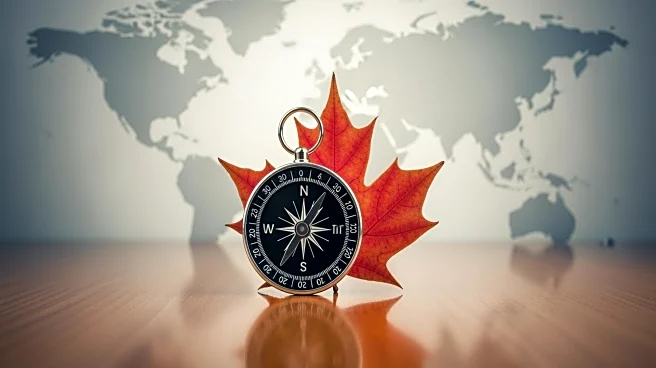What's Happening?
The Philippines and Canada have signed a significant defense agreement aimed at enhancing military cooperation between the two nations. This pact, known as the Status of Visiting Forces Agreement (SOVFA), allows for the training of armed forces on each
other's soil. It marks Canada's first such agreement in the Indo-Pacific region and is part of a broader strategy to address security concerns, particularly in light of China's assertive actions in the South China Sea. The agreement complements the Philippines' existing alliances, including its long-standing treaty with the United States. The SOVFA establishes a framework for expanded military and defense cooperation, improving operational coordination between the two countries' armed forces. Philippine Defense Secretary Gilberto Teodoro emphasized the agreement's role in preserving a rules-based international order. This development follows recent joint military exercises in the South China Sea involving the Philippines, Australia, New Zealand, and the United States, which China criticized as undermining regional peace.
Why It's Important?
The defense pact between the Philippines and Canada is a strategic move to counterbalance China's growing influence in the Indo-Pacific region. By strengthening military ties, the Philippines aims to bolster its security network and enhance its defense capabilities. This agreement is particularly significant given the ongoing territorial disputes in the South China Sea, a critical maritime area for global trade. The pact also reflects Canada's commitment to supporting the Philippines' stance against China's maritime claims, aligning with international rulings that invalidate Beijing's expansive claims. For the Philippines, this agreement not only diversifies its security partnerships but also reinforces its position in regional geopolitics. The enhanced military cooperation could lead to increased stability in the region, benefiting international trade and security.
What's Next?
Following the signing of the SOVFA, both nations are expected to initiate joint military training exercises to operationalize the agreement. The Philippines is also pursuing similar defense pacts with other countries, including Britain and France, to further expand its security alliances. Additionally, the recent formation of a joint task force between the Philippines and the United States indicates a continued focus on military readiness in the South China Sea. As these developments unfold, reactions from China and other regional stakeholders will be closely monitored, as they could influence future diplomatic and military engagements in the region.
Beyond the Headlines
The defense agreement between the Philippines and Canada highlights the shifting dynamics in the Indo-Pacific region, where smaller nations are seeking to strengthen alliances to counterbalance larger powers like China. This trend underscores the importance of multilateral cooperation in maintaining regional stability and upholding international law. The pact also raises questions about the long-term implications for regional security architecture and the potential for increased military presence by external powers in the Indo-Pacific.

















